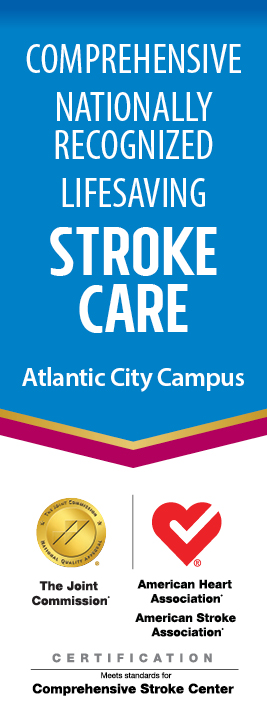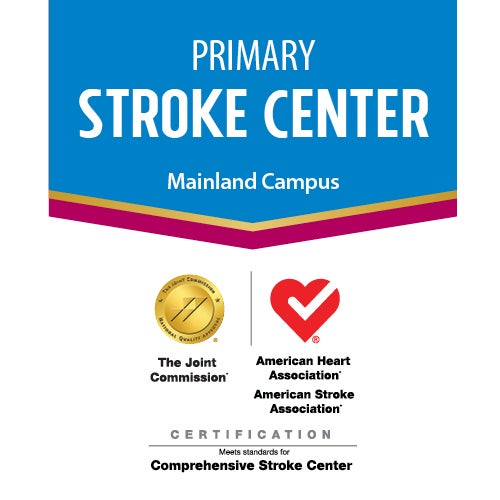Comprehensive and Primary Stroke Centers
NATIONALLY RECOGNIZED, LIFESAVING STROKE CARE.
ARMC’s City Campus has, for the fourth time in a row, earned the Joint Commission’s Gold Seal of Approval for Comprehensive Stroke Centers.
A growing body of research shows that stroke victims receive better treatment and recover with fewer disabilities at comprehensive stroke centers. These centers give you or your loved one the best chance to survive and get back to normal living.
The professional organization that designates hospitals as “Comprehensive Stroke Centers” is the Joint Commission, which develops standards for accreditation and certification from the American Heart/American Stroke Association Guidelines.

What is the Joint Commission and what gives them power to certify that a hospital meets quality standards?
- Members are individuals from the private medical sector who maintain standards of quality in U.S. medical facilities.
- The Joint Commission has no official affiliation with U.S. government regulatory agencies, and has no legal enforcement power.
- Since many medical facilities rely on the Joint Commission accreditation, it has assumed importance in the medical field despite its lack of official government sanction.
- The National Institute of Neurological Disorders and Stroke (NINDS), a division of the National Institutes of Health (NIH), has recommended that all U.S. hospitals promote their facilities for comprehensive stroke care.
The Gold Seal of Approval is the highest level of stroke certification there is. To qualify as a Comprehensive Stroke Center, a hospital must meet all of the standards to qualify as a Primary Stroke Center, plus:
- An Acute Stroke Team with training and expertise in stroke treatment must be available 24/7 in order to evaluate the arrival of any patient within fifteen minutes who may have suffered a stroke.
- A certified endovascular neurosurgeon must be available 24/7 to provide neurosurgical services to stroke patients within two hours of when services are needed.
- Each Comprehensive Stroke Center must have a neurological intensive care unit, with specialty trained staff, where patients with stroke are treated exclusively, because they require minute-by-minute monitoring and care beyond those first life-threatening minutes.
- The hospital must have written guidelines approved by the Joint Commission for emergency treatment of stroke patients. These guidelines enable the immediate diagnosis and treatment of stroke patients, as instant stroke treatment is compulsory in order to eliminate — or minimize — long-term disability.
- The Advanced Life Support providers (EMS) will be in constant communication with the hospital so the hospital will be prepared, with not a second wasted, to begin treatment when the patient arrives.
- The designated hospital’s Emergency Department staff has the training and expertise to diagnose and treat stroke. Instant lines of communication are established between the EMS team and the acute stroke team.
- The hospital has accredited expertise in performing and evaluating brain imaging studies (neuroimaging via CT or MRI scan) within 45 minutes of time ordered. A specialist must be present 24/7 to interpret findings.
- Laboratory services must be available 24/7. Time is of the essence in treating stroke, as any minute lost may mean the difference between life and death.

ARMC’s Mainland Campus is a Primary Stroke Center.
A hospital qualifies as a Primary Stroke Center only when given certification by the Joint Commission. In order to receive this certification, hospitals must use standardized methods of delivering care centered on evidence-based guidelines for stroke care.
Primary Stroke Center
Joint Commission requirements for a Primary Stroke Center are:
- 24/7 availability of specialty trained staff to treat patients with stroke, including the administration of the clot-busting medication (alteplase or tPA).
- Maintenance of 24/7 neurology and emergency department personnel trained in the treatment of acute stroke.
- Maintenance of telemetry or critical care beds.
- A specialized stroke unit staffed by physicians and nurses trained in caring for acute stroke patients.
- Accredited expertise in performing and evaluating brain imaging studies (neuroimaging via CT or MRI scan) within 45 minutes of time ordered. A specialist must be present 24/7 to interpret findings.
- 24/7 availability of laboratory services. Time is of the essence in treating stroke, as any minute lost may mean the difference between life and death.
- Availability of neurological services within two hours either at the hospital or under agreement with a Comprehensive Stroke Center.
- Availability of educational opportunities to prehospital personnel; at least two stroke education activities per year available to public.
